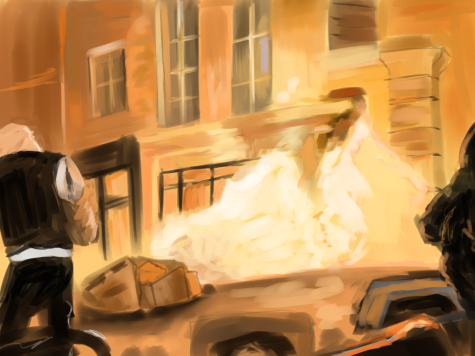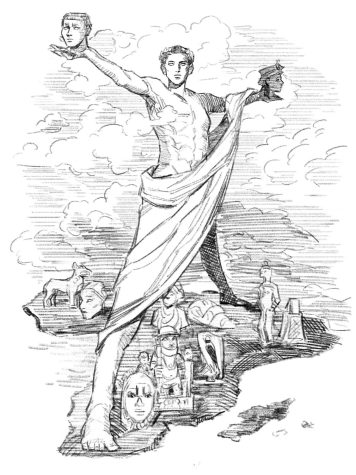A Contentious Vacancy

Art credits to Julia Sun!
April 20, 2016
On February 13, Antonin Scalia was found dead in his room at a Texan hunting resort. The cold body of the 79-year-old Supreme Court justice marked the end of a prolific career and the start of a high-stakes political brawl. Because Scalia was one of the most influential conservatives in the Supreme Court, his death has sparked a fierce and partisan battle over who gets to appoint his replacement—President Obama or the 2016 president-elect.
Justice Scalia spent almost three decades on the Supreme Court; at the time of his death, he was its longest-serving current member. Over the course of his career, he weighed in on many far-reaching cases. Arguably his most important case was 2008’s District of Columbia v. Heller, which ruled that the 2nd Amendment protects an individual’s right to own guns. In the majority opinion, Scalia wrote that he was “aware of the problem of handgun violence in this country… [However,] it is not the role of this court to pronounce the Second Amendment extinct.” As this statement suggests, Scalia kept to a philosophy of “originalism”—interpreting the Constitution exactly as the Founding Fathers intended.
Scalia, the son of a Sicilian immigrant, was born in Trenton and raised in New York. He gained a reputation as a witty, outspoken, and often controversial judiciary figure. Dissenting in the 2015 case on gay marriage, he called the majority opinion “as pretentious as its content is egotistic”. During a hearing on affirmative action, he came under fire for suggesting that black students might be more comfortable at slower-track schools. Moreover, after the Bush v. Gore case in 2000, he stated, “We did the right thing. So there. Get over it.”
Nevertheless, Scalia may have caused even more controversy in death than he did in life. In order for a justice to rise to the Supreme Court bench, he or she must be nominated by the president and confirmed by the Senate. President Obama has nominated Merrick Garland, the chief judge of the U.S. Court of Appeals for the DC Circuit, to fill the vacancy. However, Senate’s Republican majority refuses to even hold a hearing to confirm him. They claim that a lame-duck president should not be allowed to appoint a new justice who will potentially shape the court’s ideology for a generation. Rather, they argue, it should be up to the voters to decide what the new court will look like.
Although the senators claim a historical precedent for their decision, several Supreme Court nominees have been confirmed during election years. One example is John Marshall, arguably the most influential justice in history, who was nominated by President John Adams in 1801. Republicans claim that the last successful election-year confirmation—Justice Frank Murphy in 1940—happened too long ago to be considered a valid precedent. Those opposing President Obama also cite how, in 1968, Lyndon Johnson withdrew his appointment of Justice Abe Fortras when faced by a Senate filibuster.
But Democrats contend that the Senate confirmed President Reagan’s 1987 nomination of Justice Anthony Kennedy in 1988—an election year. Furthermore, Senate has never taken more than three months to vote on a nominee. There are over nine months left in President Obama’s term.
Nevertheless, the Senate majority’s decision has more to do with politics than a sense of historical or moral responsibility. Although Garland has a moderate record and has drawn Republican support in the past, he leans to the left and has voted with liberals on issues like gun control. Thus, he would shift the court’s 5-4 majority from conservative to liberal. By blocking his nomination, Senate conservatives hope that a Republican will be elected as president and appoint someone more like the late Scalia. However, this is a risky gamble. If a Democrat like Hillary Clinton wins the White House, she will likely appoint someone more liberal (and younger) than Garland (who is 63) to fill the vacant seat. In addition, Senate elections take place in November this year, and some of the 24 Republican senators up for reelection may lose their seats to Democrats due to their actions regarding the Supreme Court.
In any other year, Garland would enjoy an easy confirmation to the Supreme Court. Political commentator and New York Times columnist David Brooks describes him as “the model of judicial restraint… a man of both amazing integrity and capacity to be emotionally moved.” He also boasts impressive experience.
A Harvard Law graduate, he spent 19 years on the U.S. Court of Appeals and has previously clerked for the Supreme Court and worked in the U.S. Department of Justice. His judicial record shows a methodical, case-by-case approach to decision-making. He has proven to be tough on crime, and helped prosecute the Oklahoma City bomber in 1995. In the past, he has also favored environmental regulations and taken both sides in cases regarding government transparency and the treatment of Guantanamo Bay detainees. However, little is known about how he would vote on controversial social issues such as abortion, affirmative action, and the death penalty.
Still, some Democrats suggest that the president should have appointed a woman or a minority, which would have helped appeal to key demographics in the coming presidential election. There is also backlash against senators who refuse to confirm Garland, with voters calling on them to “Do your job.”
Mr. Zande, a U.S. History teacher at Ridge, comments, “I think Congress is constitutionally obligated to give whoever the president chooses a fair hearing. I don’t like how they’re saying they won’t give him a hearing at all. I think that’s just emblematic of poison politics.”
This Supreme Court debate may seem like just another issue in our turbulent (and often cringe-worthy) political landscape. However, this opening is more than just another issue for liberals and conservatives to get pointlessly riled up over—Supreme Court justices, and the precedents they set, have the potential to shape American society for generations.
As Kyanna Ouyang ’18 states, “The current debate over the next Supreme Court justice holds a crucial role in the legislation of the next years, maybe decades.” The decisions regarding this new Supreme Court justice (whether Merrick Garland or our next president’s pick) will be most significant to our generation—to us as Ridge students, as we grow up into adults and become voters in this country.


